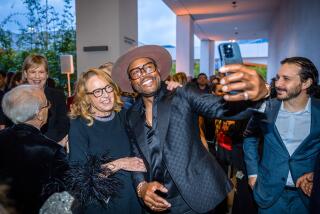Feeding the Hungry Muse
- Share via
“Patron of the Arts.”
The phrase conjures a medieval nobleman capriciously exerting his taste over culture. But there is nothing of the Borgias in Patrick Lannan Jr.’s demeanor. He is not flamboyant, but he is fond of the literary anecdote. A volume of Beckett is the brashest item in Lannan’s austere office, and sure enough, late in our conversation, there is an anecdote about Beckett.
The $100 million Lannan Foundation was started by Lannan’s father in 1960. While the foundation gave most of its assets for several decades to the visual arts, Lannan senior, who died in 1983, was a poetry lover; Chairman of the Board of the Modern Poetry Association for 30 years and benefactor of Poetry Magazine. Lannan junior took over when his father died, and initiated the foundation’s literary program in 1987; in 1989, the first Lannan Literary Awards were given. In 1991, the foundation added the Readings & Conversations series. Proceeds go to the charitable organization of the author’s choice. “Language is so debased in contemporary culture,” says Lannan. “It’s refreshing to be in a literary environment. I remember hearing Seamus Heaney read right after the Clarence Thomas hearings. It was wonderful to hear someone saying what he meant. These writers are protecting the language.”
“We knew there was a need for support,” says Lannan of the literary program, “particularly among those writers not immediately connected to the academy. I’ve always felt there’d be more vibrancy in American poetry if some of our poets did not depend on academia.”
Each year, nine prizes--$40,000 each in the form of awards and fellowships--are given to poets and authors of both fiction and nonfiction. This is a lot of money, with virtually no strings attached except that fellowship winners must write a letter to the foundation describing what they have been doing. Carolyn Forche, a 1990 Poetry Fellowship winner wrote in her letter to Lannan that the money allowed her, to travel to the country of her family’s origin, Czechoslovakia. There she met, for the first time, her grandmother’s sister’s daughter: “As Anna, my grandmother, was one of the strongest presences in my life and work, and as I lost her in 1968, I cannot possibly tell you how much it means to me to have been blessed with the love and friendship of her niece. Thank you for that.” Forche was also able to complete several projects that year.
Could it be that there is finally some big money in Poetry? The last few months here in Los Angeles, for example, have witnessed the $9000 L.A. Poetry Festival Prize (awarded in October), and the recent announcement of the Kingsley Tufts Poetry Award at the Claremont Graduate School--$50,000 to be awarded annually to an American poet through an endowment grant of $1.25 million from Kate Tufts to honor her late husband, the poet and writer for whom the prize is named.
Lannan believes that money can help writers to be more productive. More importantly, the fellowships provide a confirmation that society values their work in a very tangible way. For people who often live on the social and economic margins, this is a boost. Most of all, he enjoys getting young writers in touch with older, more established writers, like Adrienne Rich and Li-Young Lee, a poet and lifetime admirer of Rich’s who is currently working on a long poem that is a response to her work. Or Kate Moses, San Francisco writer and editor, whom Lannan sent to visit the aging Kay Boyle several years ago. When Moses told Boyle that she was planning a trip to Europe, Boyle, who had read in a magazine interview that an old writer friend’s feet were giving him trouble, asked Moses to deliver a pair of Rockport shoes to his door.
Beckett was delighted with the shoes. The story goes, he danced around the room.
More to Read
Sign up for our Book Club newsletter
Get the latest news, events and more from the Los Angeles Times Book Club, and help us get L.A. reading and talking.
You may occasionally receive promotional content from the Los Angeles Times.







